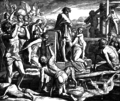
Back درگاه:شهرها Persian Wikipedia:Pooz/Städt KSH Portaal:Steden Dutch Cổng thông tin:Thành phố Vietnamese
The Cities Portal

A city is a human settlement of a notable size. The term "city" has different meanings around the world and in some places the settlement can be very small. Even where the term is limited to larger settlements, there is no universally agreed definition of the lower boundary for their size. In a more narrow sense, a city can be defined as a permanent and densely populated place with administratively defined boundaries whose members work primarily on non-agricultural tasks. Cities generally have extensive systems for housing, transportation, sanitation, utilities, land use, production of goods, and communication. Their density facilitates interaction between people, government organizations, and businesses, sometimes benefiting different parties in the process, such as improving the efficiency of goods and service distribution.
Historically, city dwellers have been a small proportion of humanity overall, but following two centuries of unprecedented and rapid urbanization, more than half of the world population now lives in cities, which has had profound consequences for global sustainability. Present-day cities usually form the core of larger metropolitan areas and urban areas—creating numerous commuters traveling toward city centres for employment, entertainment, and education. However, in a world of intensifying globalization, all cities are to varying degrees also connected globally beyond these regions. This increased influence means that cities also have significant influences on global issues, such as sustainable development, climate change, and global health. Because of these major influences on global issues, the international community has prioritized investment in sustainable cities through Sustainable Development Goal 11. Due to the efficiency of transportation and the smaller land consumption, dense cities hold the potential to have a smaller ecological footprint per inhabitant than more sparsely populated areas. Therefore, compact cities are often referred to as a crucial element in fighting climate change. However, this concentration can also have some significant negative consequences, such as forming urban heat islands, concentrating pollution, and stressing water supplies and other resources. (Full article...)
Selected city -

Havana (/həˈvænə/; Spanish: La Habana [la aˈβana] ) is the capital and largest city of Cuba. The heart of the La Habana Province, Havana is the country's main port and commercial center. It is the most populous city, the largest by area, and the second largest metropolitan area in the Caribbean region. The population in 2002 was 2,137,847 inhabitants, and its area is 728.26 km2 (281.18 sq mi) for the capital city side and 8,475.57 km2 for the metropolitan zone.
Havana was founded by the Spanish in the 16th century. It served as a springboard for the Spanish conquest of the Americas, becoming a stopping point for Spanish galleons returning to Spain. Philip II of Spain granted Havana the title of capital in 1607. Walls and forts were built to protect the city. (Full article...)Did you know -
- ... that the women's race at today's New York City Marathon will feature two of the medalists from this year's Olympic marathon?
- ... that the 1978 New York City newspaper strike has been theorized to have caused great misery in Boston sports fans?
- ... that after the 2023 New York City parking garage collapse, a robotic dog named Digidog was deployed by the New York City Fire Department?
- ... that Miao Poya successfully campaigned to change her high school's uniform policy before becoming one of the first Taipei city councillors to be openly lesbian?
- ... that New York City officials seized the tax-exempt Moore-Jackson Cemetery in 1954 for nonpayment of taxes?
- ... that New York City's Bartow–Pell Mansion became a museum after its operator was restricted from importing and exporting plants?
Related portals
Related WikiProjects
Varanasi (ISO: Vārāṇasī, Hindi: [ʋaːˈraːɳəsi] ; also Benares, Banaras (Banārasa [bəˈnaːrəs] ) or Kashi (Kāśī [ˈka:ʃi] )) is a city on the Ganges river in northern India that has a central place in the traditions of pilgrimage, death, and mourning in the Hindu world. The city has a syncretic tradition of Islamic artisanship that underpins its religious tourism. Located in the middle-Ganges valley in the southeastern part of the state of Uttar Pradesh, Varanasi lies on the left bank of the river. It is 692 kilometres (430 mi) to the southeast of India's capital New Delhi and 320 kilometres (200 mi) to the southeast of the state capital, Lucknow. It lies 121 kilometres (75 mi) downstream of Prayagraj, where the confluence with the Yamuna river is another major Hindu pilgrimage site.
Varanasi is one of the world's oldest continually inhabited cities. Kashi, its ancient name, was associated with a kingdom of the same name of 2,500 years ago. The Lion capital of Ashoka at nearby Sarnath has been interpreted to be a commemoration of the Buddha's first sermon there in the fifth century BCE. In the 8th century, Adi Shankara established the worship of Shiva as an official sect of Varanasi. Tulsidas wrote his Awadhi language epic, the Ramcharitmanas, a Bhakti movement reworking of the Sanskrit Ramayana, in Varanasi. Several other major figures of the Bhakti movement were born in Varanasi, including Kabir and Ravidas. In the 16th century, Rajput nobles in the service of the courts and armies of the Mughal emperor Akbar, sponsored the building or further enhancement of the major Shiva temple in the city; they also built other temples, all displaying an empire-wide architectural style. Under the Treaty of Faizabad, the East India Company acquired Benares in 1775, the city later successively becoming a part of the Benares Division in the Ceded and Conquered Provinces, the North-Western Provinces, and the United Provinces, and after India's independence of Uttar Pradesh. (Full article...)Selected article -

The written history of New York City began with the first European explorer, the Italian Giovanni da Verrazzano in 1524. European settlement began with the Dutch in 1608 and New Amsterdam was founded in 1624.
The "Sons of Liberty" campaigned against British authority in New York City, and the Stamp Act Congress of representatives from throughout the Thirteen Colonies met in the city in 1765 to organize resistance to Crown policies. The city's strategic location and status as a major seaport made it the prime target for British seizure in 1776. General George Washington lost a series of battles from which he narrowly escaped (with the notable exception of the Battle of Harlem Heights, his first victory of the war), and the British Army occupied New York and made it their base on the continent until late 1783, attracting Loyalist refugees. (Full article...)General images -
Topics
List articles
Subcategories
Associated Wikimedia
The following Wikimedia Foundation sister projects provide more on this subject:
-
Commons
Free media repository -
Wikibooks
Free textbooks and manuals -
Wikidata
Free knowledge base -
Wikinews
Free-content news -
Wikiquote
Collection of quotations -
Wikisource
Free-content library -
Wikiversity
Free learning tools -
Wiktionary
Dictionary and thesaurus
© MMXXIII Rich X Search. We shall prevail. All rights reserved. Rich X Search






































